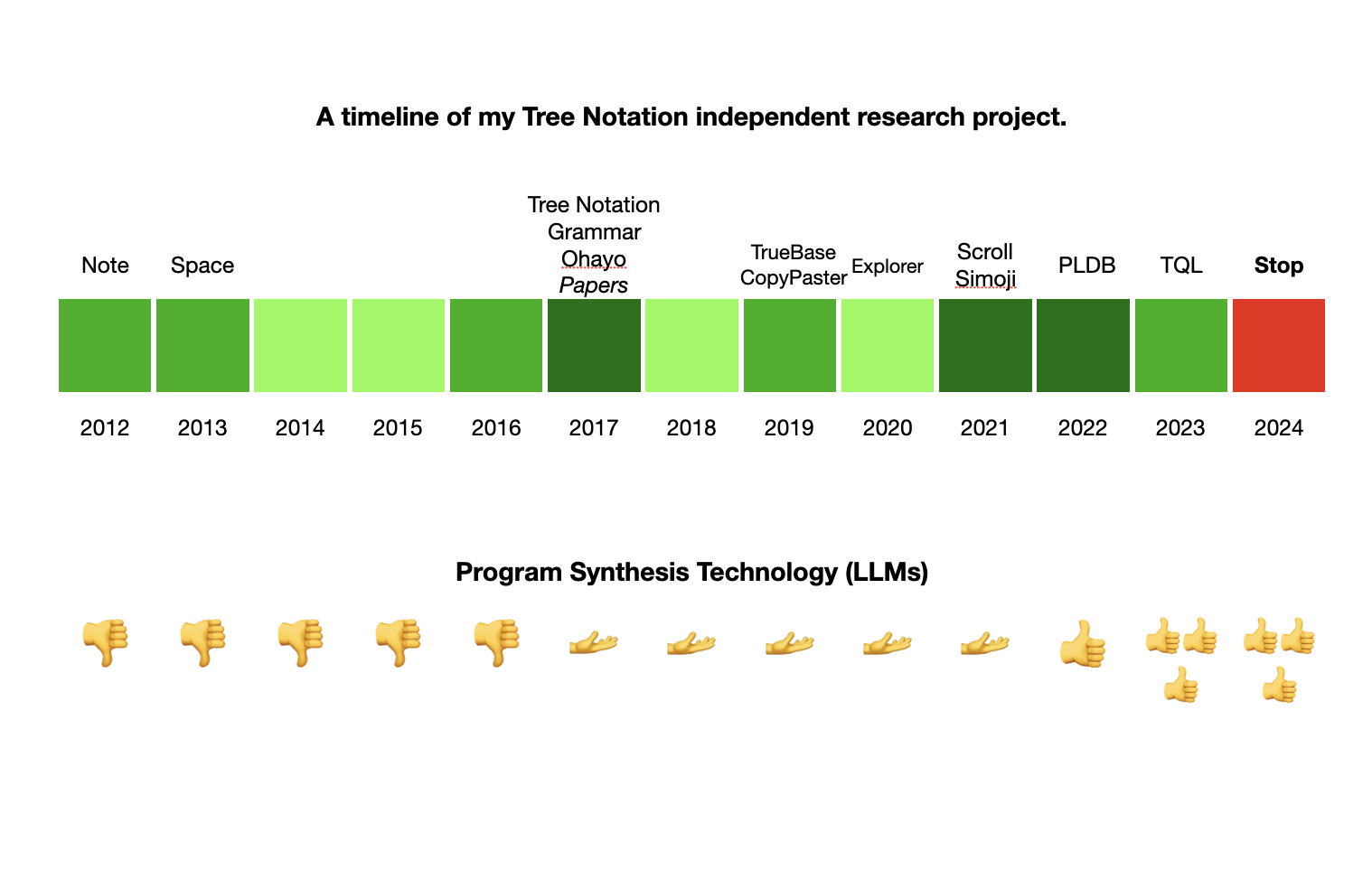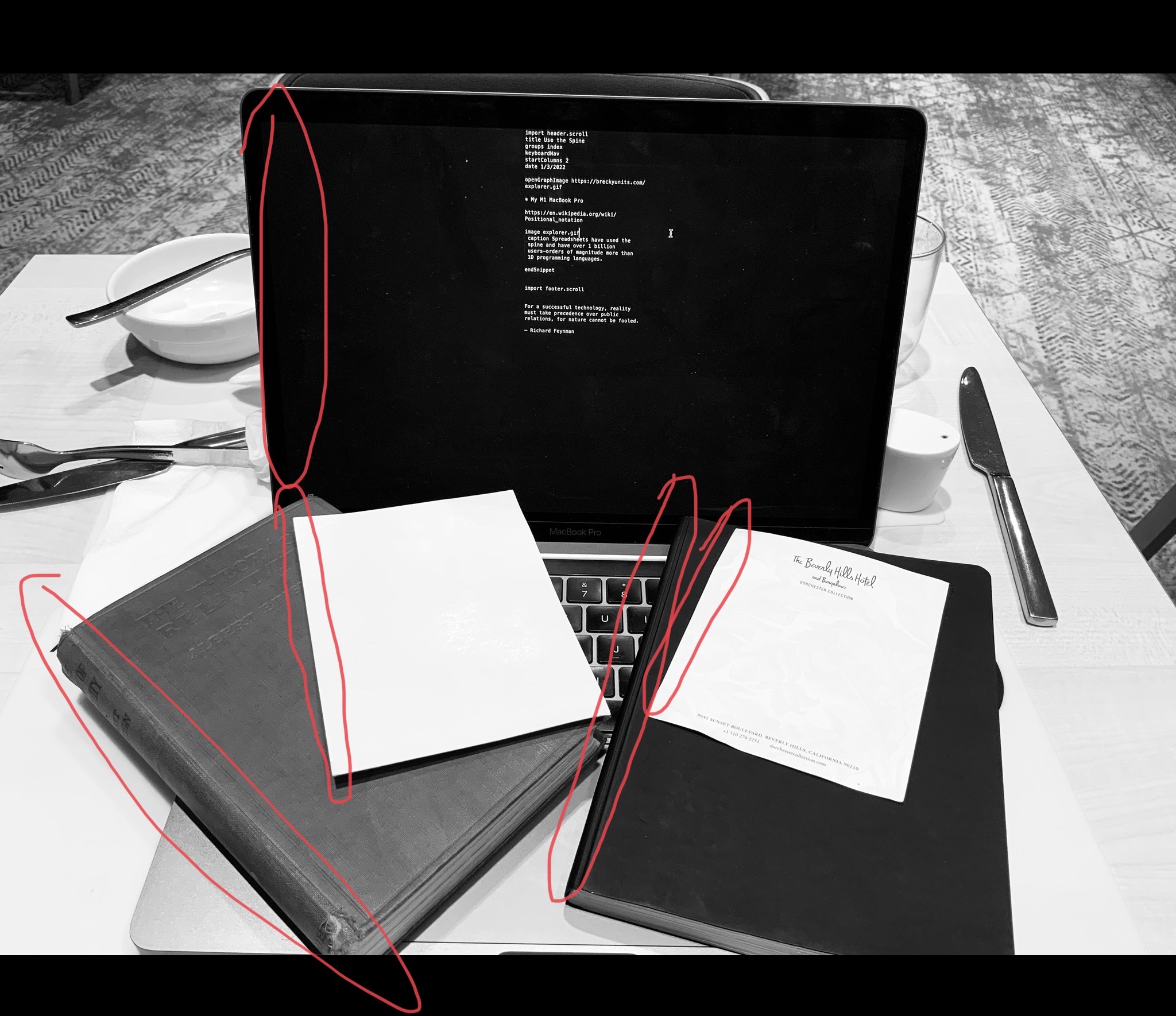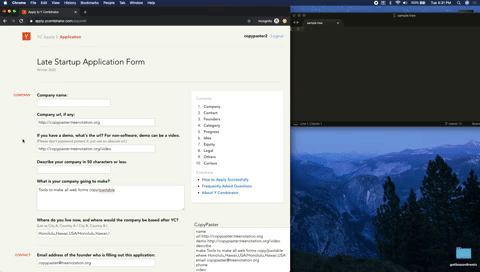
April 2, 2024 — It has been over 3 years since I published the 2019 Tree Notation "Annual" Report. An update is long overdue. This is the second and last report as I am officially concluding the Tree Notation project.
I am deeply grateful to everyone who explored this idea with me. I believe it was worth exploring. Sometimes you think you may have discovered a new continent but it turns out to be just a small, mildly interesting island.
Continue reading...January 12, 2024 — For decades I had a bet that worked in good times and bad: time you invest in word skills easily pays for itself via increased value you can provide to society. If the tide went out for me I'd pick up a book on a new programming language so that when the tide came back in I'd be better equipped to contribute more. I also thought that the more society invested in words, the better off society would be. New words and word techniques from scientific research helped us invent new technology and cure disease. Improvements in words led to better legal and commerce and diplomatic systems that led to more justice and prosperity for more people. My read on history is that it was words that led to the start of civilization, words were our present, and words were our future. Words were the safe bet.
Continue reading...December 28, 2023 — I thought we could build AI experts by hand. I bet everything I had to make that happen. I placed my bet in the summer of 2022. Right before the launch of the Transformer AIs that changed everything. Was I wrong? Almost certainly. Did I lose everything? Yes. Did I do the right thing? I'm not sure. I'm writing this to try and figure that out.
Continue reading...June 16, 2023 — Here is an idea for a simple infrastructure to power all government forms, all over the world. This system would work now, would have worked thousands of years ago, and could work thousands of years in the future.
Continue reading...January 3, 2023 — Greater than 99% of the time symbols are read and written on surfaces with spines. You cannot get away from it. Yet still, amongst programming language designers there exists some sort of "spine blindness". They overlook the fact that no matter how perfect their language, it will always be read and written by humans on surfaces with spines, as surely as the sun rises. Why they would fight this and not embrace this is beyond me. Nature provides, man ignores.

My M1 MacBook screen, paper notebook, notepads, and my 1920 copy of Einstein's Theory of Relativity, all have spines.
December 30, 2022 — Forget all the "best practices" you've learned about web forms. Everyone is doing it wrong. The true best practice is this: every web form on earth can and should be replaced by a single textarea.

Every single web form on earth can (and should) be represented in a single textarea as plain text with no visible syntax using Tree Notation or a similar base 2D notation. In this demo gif we see someone using one textarea to fill out an application to YCombinator. As this continues to catch on, the network effects will take over and conducting business on the web will become far faster and more user friendly (web 4.0?).
November 16, 2022 — I dislike the term first principles thinking. It's vaguer than it needs to be. I present an alternate term: root thinking. It is shorter, more accurate, and contains a visual:
Sometimes we get something wrong near the root which limits our late stage growth. To reach new heights, we have to backtrack and build up from a different point.
December 15, 2021 — Both HTML and Markdown mix content with markup:
html
A link in HTML looks like <a href="hi.html">this</a>
markdown
A link in Markdown looks like [this](hi.html).
I needed an alternative where content is separate from markup. I made an experimental minilang I'm calling Aftertext.
aftertext
A link in Aftertext looks like this.
link hi.html thisContinue reading...
chat
hey. I just added Dialogues to Scrolldown.
cool. But what's Scrolldown?
Scrolldown is a new alternative to Markdown that is easier to extend.
how is it easier to extend?
because it's a tree language and tree languages are highly composable. for example, adding dialogues was a simple append of 11 lines of grammar code and 16 lines of CSS.
okay, how do I use this new feature?
the source is below!Continue reading...
February 28, 2021 — I thought it unlikely that I'd actually cofound another startup, but here we are. Sometimes you gotta do what you gotta do.
We are starting the Public Domain Publishing Company. The name should be largely self-explanatory.
If I had to bet, I'd say I'll probably be actively working on this for a while. But there's a chance I go on sabbatical quick.
The team is coming together. Check out the homepage for a list of open positions.
February 22, 2021 — Today I'm launching the beta of something new called Scroll.
I've been reading the newspaper everyday since I was a kid. I remember I'd have my feet on the ground, my body tilted at an angle and my body weight pressed into the pages on the counter. I remember staring intently at the pages spread out before me. World news, local news, sports, business, comics. I remember the smell of the print. The feel of the pages. The ink that would be smeared on my forearms when I finished reading and stood back up straight. Scroll has none of that. But it does at least have the same big single page layout.
Continue reading...December 9, 2020 — Note: I wrote this early draft in February 2020, but COVID-19 happened and somehow 11 months went by before I found this draft again. I am publishing it now as it was then, without adding the visuals I had planned but never got to, or making any major edits. This way it will be very easy to have next year's report be the best one yet, which will also include exciting developments in things like non-linear parsing and "forests".
In 2017 I wrote a post about a half-baked idea I named TreeNotation.
Since then, thanks to the help of a lot of people who have provided feedback, criticism and guidance, a lot of progress has been made flushing out the idea. I thought it might be helpful to provide an annual report on the status of the research until, as I stated in my earlier post, I "have data definitively showing that Tree Notation is useful, or alternatively, to explain why it is sub-optimal and why we need more complex syntax."
Continue reading...January 29, 2020 — In this long post I'm going to do a stupid thing and see what happens. Specifically I'm going to create 6.5 million files in a single folder and try to use Git and Sublime and other tools with that folder. All to explore this new thing I'm working on.
TreeBase is a new system I am working on for long-term, strongly-typed collaborative knowledge bases. The design of TreeBase is dumb. It's just a folder with a bunch of files encoded with Tree Notation. A row in a normal SQL table in TreeBase is roughly equivalent to a file. The filenames serve as IDs. Instead of each using an optimized binary storage format it just uses plain text like UTF-8. Field names are stored alongside the values in every file. Instead of starting with a schema you can just start adding files and evolve your schema and types as you go.
Continue reading...January 20, 2020 — In this post I briefly describe eleven threads in languages and programming. Then I try to connect them together to make some predictions about the future of knowledge encoding.
This might be hard to follow unless you have experience working with types, whether that be types in programming languages, or types in databases, or types in Excel. Actually, this may be hard to follow regardless of your experience. I'm not sure I follow it. Maybe just stay for the links. Skimming is encouraged.
Continue reading...January 3, 2020 — Speling errors and errors grammar are nearly extinct in published content. Data errors, however, are prolific.
Continue reading...June 23, 2017 — I just pushed a project I've been working on called Ohayo.
You can also view it on GitHub: https://github.com/treenotation/ohayo
I wanted to try and make a fast, visual app for doing data science. I can't quite recommend it yet, but I think it might get there. If you are interested you can try it now.
June 21, 2017 — Eureka! I wanted to announce something small, but slightly novel, and potentially useful.
What did I discover? That there might be useful general purpose programming languages that don't use any visible syntax characters at all.
I call the whitespace-based notation Tree Notation and languages built on top of it Tree Languages.
Continue reading...September 23, 2013 — Making websites is slow and frustrating.
Continue reading...December 14, 2012 — Note is a structured, human readable, concise language for encoding data.
Continue reading...